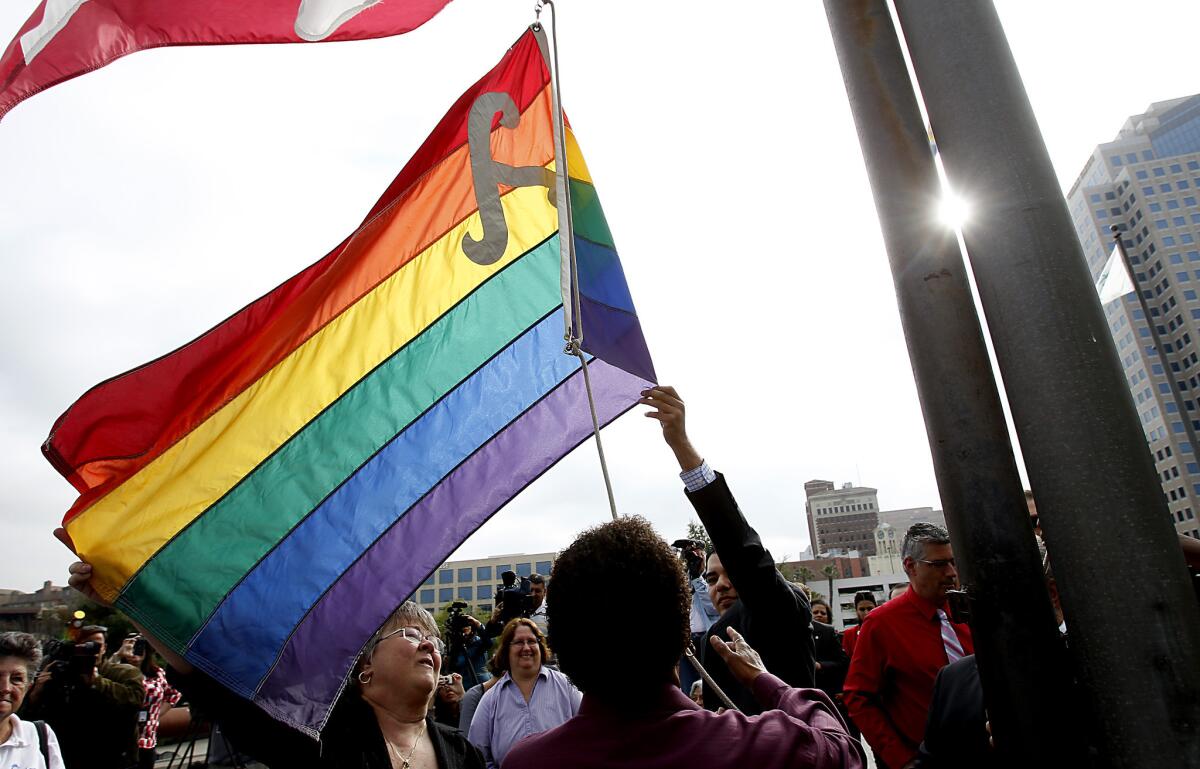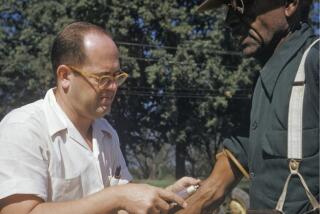Same-sex marriage may overshadow other LGBT issues, poll finds

- Share via
As Americans await Supreme Court rulings tied to same-sex marriage, a sweeping new study of gay, lesbian, bisexual and transgender Americans finds some fear that the battle over marriage has drawn too much attention away from other problems they face.
Nearly all of the LGBT adults surveyed supported gay marriage, and a majority wanted to get married someday or already were wed. But 39% said they worried that the marriage fight had pulled focus away from issues such as workplace problems and adoption rights, the Pew Research Center found.
“There’s clear evidence that people were at least as concerned about employment discrimination as they were about marriage equality,” said researcher Gary J. Gates of the Williams Institute at the UCLA School of Law, who served as an advisor on the study. “That’s been an ongoing struggle in the LGBT movement -- how do you prioritize these issues?”
The results were part of the first such survey done by Pew, which polled nearly 1,200 gay, lesbian, bisexual and transgender adults using an online questionnaire covering a vast swath of topics, including when they came out, how often they went to worship, and even things as specific as whether they had ever avoided a business because of its stance on gay rights.
The overwhelming majority of LGBT people surveyed said that society had grown more accepting over the past decade and would continue to do so in the decade to come. Yet many said they had faced slurs, rejection or worse. Nearly a third had been threatened or physically attacked at some time in their life, Pew found.
For the LGBT community, “these are the best of times -- but that doesn’t mean they are easy times,” said Paul Taylor, executive vice president of the Pew Research Center. “Many are still searching to find a comfortable, secure place in a society where acceptance is growing -- but still limited.”
The biggest group of people who responded to the survey were bisexuals, a group that is often overlooked in discussions about the LGBT community. Bisexuals were much less likely than gays or lesbians to be out, with only 28% saying all or most of the important people in their lives knew about their sexual orientation, compared with 77% among gay men and 71% of lesbians.
Most bisexuals who were in committed relationships were with someone of the opposite sex, the survey found, and less than half said being bisexual was somewhat or very important to their identity.
Other findings from the survey included:
--Sixty percent of the respondents said they were either married or wanted to get married someday, compared with 76% of the general public. Among those who were legally married (16%), most were bisexuals wed to someone of the opposite sex. Slightly more than half of LGBT people surveyed said they had children or wanted to have them.
--Gay men most commonly said they first thought they might not be straight around the age of 10. Lesbians and bisexuals first had that thought around the age of 13, on average. Men who ultimately realized they were gay first told a close friend or family member around the age of 18, while bisexuals did so around the age of 20 and lesbians around the age of 21, median figures show.
--Compared with other Americans, the gay community is younger, more liberal, less religious and more educated. It is also less happy, with 18% saying they were “very happy” compared with 30% of the general public. Its racial makeup is similar to the nation at large.
--Though the gay community is less religious than the general public, there was still a significant fraction -- 13% -- who told Pew they went to religious services at least weekly. Seventeen percent said they identified with a religion that was very important in their lives. Among those who had a religious affiliation, two out of three said there was no conflict between their religious beliefs and their sexual orientation.
--Only 12% of those surveyed said they currently live somewhere known as an LGBT neighborhood, such as West Hollywood in Los Angeles. Another 14% said they had lived in an LGBT neighborhood in the past.
--Who was the biggest champion of gay rights? Nearly one out of four respondents said that among public figures, President Obama was most responsible for advancing the cause. Second to the president was talk show host Ellen DeGeneres, who was named by 18% of those surveyed. Smaller percentages named Anderson Cooper, Hillary Rodham Clinton, Barney Frank and Neil Patrick Harris.
ALSO:
Ariel Castro’s lawyer: Some kidnap charges ‘cannot be disputed’
Prognosis is good for girl’s adult lung transplant, her family says
NSA leak and armored-truck robbery: the odd Florida connection
More to Read
Sign up for Essential California
The most important California stories and recommendations in your inbox every morning.
You may occasionally receive promotional content from the Los Angeles Times.










